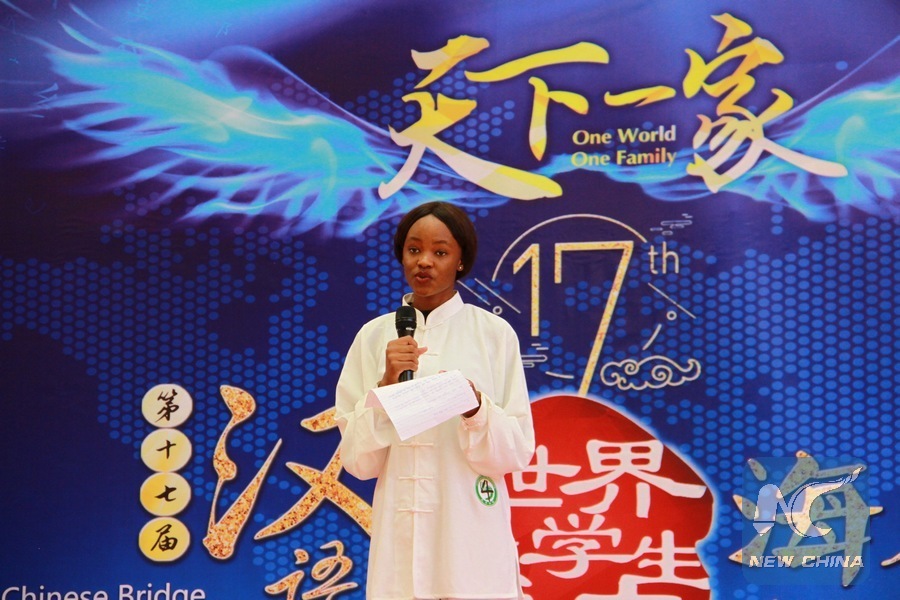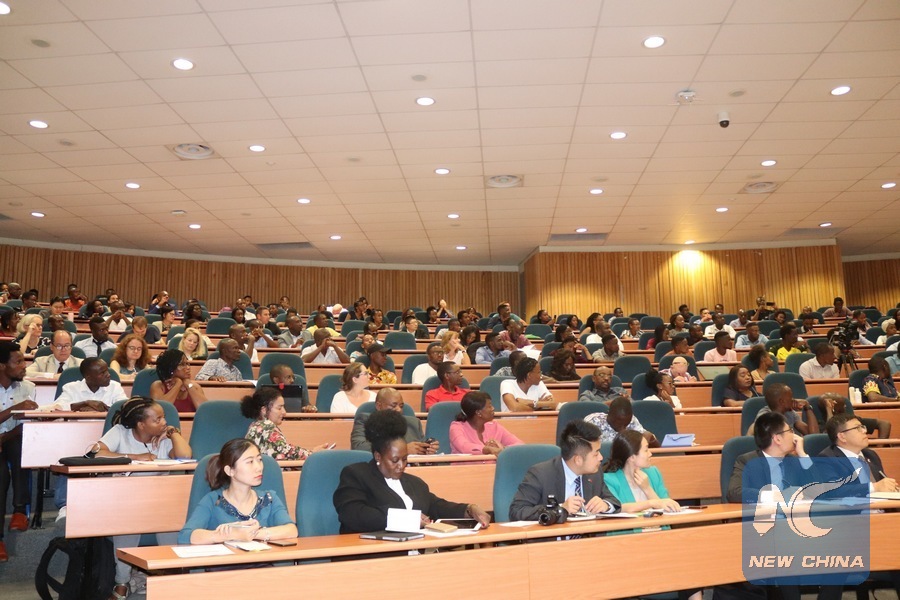
A student takes part in the 17th Chinese-Bridge Proficiency Competition for College students in Windhoek, capital of Namibia, April 26, 2018. The competition was organized by the Confucius Institute in Namibia. (Xinhua/Wu Changwei)
by Ndalimpinga Iita
WINDHOEK, April 10 (Xinhua) -- Namibian youths are embracing Chinese to seize opportunities coming with the robust bilateral ties between Namibia and China.
Jacobina Aumbandja, pursuing a Bachelor of Arts at the University of Namibia (UNAM), registered for a Chinese language course at the Confucius Institute in the University in Windhoek in February 2017.
"Interest for the Chinese culture, language and customs attracted me to the course," Aumbandja said Tuesday.
She said she found the course enthralling.
"Chinese grammar at the beginner level is significantly simpler than English. Mandarin characters are the hardest part in the beginning, and characters take more than one practice, a challenge which for a moment looks insurmountable," she said.
At first captivated by the culture and language, it is believed learning Chinese would present breakthroughs in careers.
Yang Xingang, a Chinese teacher at the Institute, said that Chinese language aids young Namibians to diversify social and economic prospects in light of robust investment between China and Namibia.
According to Aumbandja, the course taught her how to compete effectively in the business environment.
The language helps me in negotiating for bargains at the industrial China town shops in Windhoek, she said.
"You are most likely to get discount if you know how to speak a bit of mandarin," she said.
She is not the only one in the learning.
Mon Shifotoka enrolled for the course this year. She said that studying Chinese is an extension of the studies in China a year back.
For the communications and media graduate, fluency in Mandarin will increase her chances of getting employment in international development agencies.
"It enables me to continue nurturing relations with Chinese people, embrace multiculturalism and boost prospects," Shifotoka said.
Since its establishment in 2013 with support from the University of Namibia and China University of Geosciences, the Confucius Institute has made great progress, training more than 3000 students so far.
Zhang Fan, director of the Confucius Institute, said that more locals have shown interest in the program, with more learners enrolled compared to last year's figure of 1,153 students.
"Chinese course is open for UNAM students and all locals. We have daytime and evening course for basic Chinese. We also have Chinese course for bankers and will have a course for tour guides in 2019," he said.
The institute has over the years transformed into a platform to learn Chinese. It is also a name card to display Chinese culture and a bridge of China-Namibia cultural exchanges.

Participants follow proceedings during the fourth annual Theo Ben-Gurirab lecture series at the Namibia University of Science and Technology in Windhoek, capital of Namibia, Feb. 28, 2019. Implementation of the outcomes of the 2018 Beijing Summit of the Forum on China-Africa Cooperation (FOCAC) has already started in different parts of the African continent, Charge d'affaires of the Chinese Embassy in Namibia said on Thursday. (Xinhua/Tirivangani Masawi)
In addition to language skills acquisition, students like Aumbandja have been exposed to many cultural activities.
The institute hosts the Chinese proficiency competitions both in college and secondary school level, with summer camps to China. It provides scholarship programs and has established a radio program to introduce China called "Hello, China!"
"I developed an appreciation for Chinese culture and history. I learned how to cook Chinese food and dance. Learning a language is a good skill," said Aumbandja.
Meanwhile, plans are underway to expand the teaching of the Chinese language.
"We are planning to introduce the Chinese language in schools in the Khomas region. The application to introduce the Chinese language as a foreign language as part of the Namibian curriculum has been submitted to National Institute for Educational Development through the Khomas Directorate of Education under the Ministry of Education, Arts and Culture," Zhang said.

